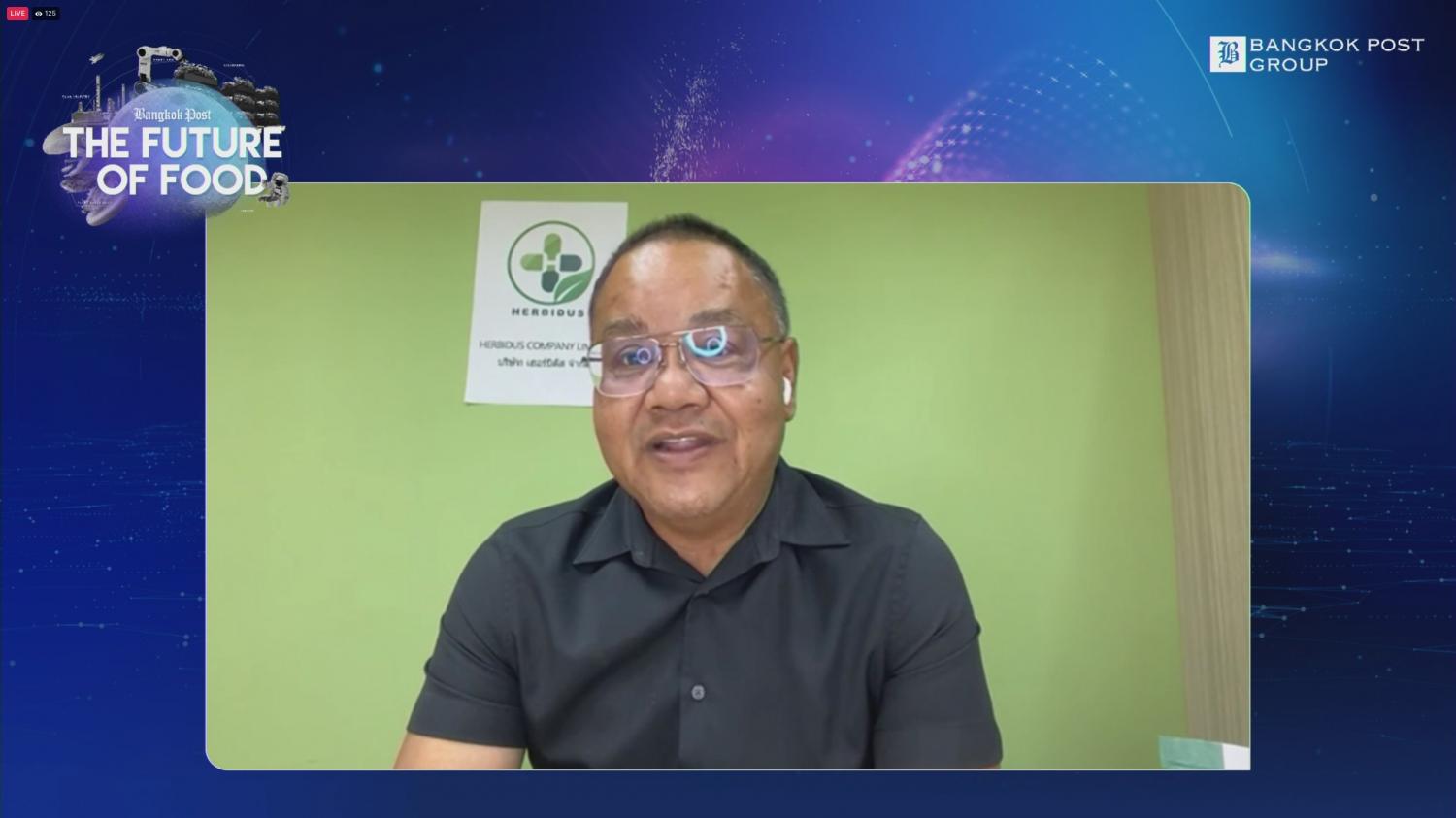
The Covid-19 pandemic marks the beginning of a full-scale revolution in the food industry, according to leaders in the field.
Consumer behaviour has changed, with many people now cooking at home instead of eating out and shopping at small shops nearby their residences. More people use delivery services and are eating healthy foods in an effort to curb viral infections, leading food manufacturers and retailers to change their business.
Julpas Tom Kruesopon, the founder of Golden Triangle Health Co, Paisarn Aowsathaporn, managing director of Bistro Asia Co, and Santi Abakaz, chief executive and co-founder of Tastebud Lab and Bio Buddy shared their views on Thursday on the future of the Thai food industry at a Bangkok Post virtual seminar.
PROPER POLICIES PUSHED
The future of food is bright and Thailand is ready to lead the sector, but a policy direction is critical as bureaucracy has hampered the industry's potential to grow, said Mr Tom.
He said as a result of the pandemic, everyone has become more aware of their health. Mr Tom believes a major food trend is health, especially herbal-based foods.
He lamented that the industry is being held back by authorities that encourage the wrong types of agricultural products.
"The country's farmers should grow kratom or cannabis because they have higher sales value and are a lot better than growing rice, which is only encouraged for politicians to gain votes," said Mr Tom.
There has been no progress in the last 2-3 years in the Thai food industry and the country is in the backseat instead of leading, he said.
Mr Tom criticised current authority figures as "stuck in the 18th century of Thai farming".
"Thailand is always ready to lead the world in the food industry. We just need better policies," he said.
Mr Tom said kratom is a US$2 billion industry as a dietary supplement for anxiety, Alzheimer's disease, and sleep disorders in the US.
While Indonesia has pounced on this market, Thailand is unable to because of obstacles put up by the Public Health Ministry for kratom production, he said.
Another product the country has failed to capitalise on is called Thai sticks, a valued cannabis strain native to Thailand, said Mr Tom.
He also shared an anecdote about his interaction with an American who said a strain of coffee from Nan province is highly valuable and would sell well, but it is difficult to develop the production facilities because of government regulations on shipping the product.
"Thailand is ready to go. We just need the right policies and mindset from authorities for this to happen," Mr Tom said.
As an example, he said NR Instant Produce Plc, a food distributor under GTH, is involved in Elon Musk's project to colonise Mars and create food on the planet.

CONSUMERS MORE EMOTIONAL
Mr Paisarn, head of Bistro Asia Co, the operator of Baan Suriyasai, Hyde & Seek and SO asean, said with the global population expected to reach 10 billion by 2050 according to UN data, food consumption will definitely rise.
Estimates project by 2050, food consumption will increase by 70%, he said.
"Global food trends are happening in Thailand, including food for health, food for sustainability and food for culture," said Mr Paisarn. "Consumers' eating behaviour changed during the pandemic, with demand for food delivery growing greatly. Restaurant operators have to develop food products that mesh with the delivery channel in terms of product quality, freshness and sustainable packaging."
He said consumers not only look at food as nourishment, but also develop an emotional attachment to products that are good for the earth and society.
"The world is moving towards the ideology of green. This word has many meanings including sustainability and environmental friendliness," said Mr Paisarn. "The restaurant greenery concept is an upcoming trend where consumers desire to feel good about saving the world and feel close to nature as they value trees, leaves and animals as friends."
He said there is still a vast opportunity for organic products in the market.
"Everybody loves to eat organic products, but how do they know they are really organic? Business owners need to be transparent about their organic products," said Mr Paisarn. "There are many plots of farmland that plant organic products in Thailand, but farmers still cannot sell their output."
The government should support these farmers through marketing and helping to set higher product prices because of the higher cost of planting, he said.
Mr Paisarn said the Thai food industry could become the world's kitchen if some regulations are unlocked, the government offers serious funding for research and allows freer competition.

MORE LINKAGES
To create a brighter future for food businesses in Thailand, the public and private sectors need to connect food development with technological innovations, safety issues and even soft power, said Mr Santi.
Consumer behaviour is changing, so businesses cannot think of food as merely a way to bolster human energy, he said.
"Population growth will determine future food demand as will changes in people's lifestyles, such as those caused by the pandemic and the shift to an ageing society," said Mr Santi.
He believes people will be more aware of health and safety issues when they buy food, as many of them can afford to pay for healthy, premium food. This trend aligns with improved efforts to protect the environment, said Mr Santi.
Technologies will also play an increasing role in developing the food of the future, he said.
"Digital technology, robotics, artificial intelligence, the metaverse and even blockchain technology can all support food development," said Mr Santi.
A connection can also be made between food and the creative economy, which can promote Thai cultural products and services through the use of soft power. Thai food is among many well-known cultural products, he said.
Mr Santi suggested the government come up with clear food development plans, utilising a food database and infrastructure to better support manufacturers.
"We need the government's financial support. Funds should not be limited to loans from financial institutions or fundraising in the stock market," he said.
Small and medium-sized enterprises especially need support in order to grow in future food-related businesses, said Mr Santi.







